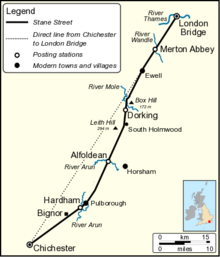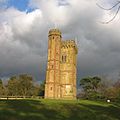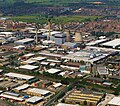Portal:South East England
The South East England Portal

South East England is one of the nine official regions of England in the United Kingdom at the first level of ITL for statistical purposes. It consists of the nine counties of Berkshire, Buckinghamshire, East Sussex, Hampshire, the Isle of Wight, Kent, Oxfordshire, Surrey and West Sussex. Cities and towns in the region include Aldershot, Ashford, Aylesbury, Basingstoke, Bracknell, Brighton and Hove, Canterbury, Chichester, Crawley, Eastbourne, Farnborough, Gosport, Guildford, Hastings, High Wycombe, Margate, Maidstone, Medway, Milton Keynes, Newport, Oxford, Portsmouth, Ramsgate, Reading, Slough, Southampton, Winchester, Woking and Worthing.
South East England is the third-largest region of England, with a land area of 19,072 square kilometres (7,364 sq mi), and is also the most populous with a total population of 9,379,833 in 2022. The region contains eight legally chartered cities: Brighton and Hove, Canterbury, Chichester, Milton Keynes, Oxford, Portsmouth, Southampton and Winchester. The region's close proximity to London has led to South East England becoming a prosperous economic hub with the largest economy of any region in the UK, after London. The region is home to Gatwick Airport, the UK's second-busiest airport, and Heathrow Airport (the UK's busiest airport) is located adjacent to the region's boundary with Greater London. The coastline along the English Channel provides numerous ferry crossings to mainland Europe.
The region is known for its countryside, which includes two national parks: the New Forest and the South Downs, as well as the North Downs, the Chiltern Hills and part of the Cotswolds. The River Thames flows through the region and its basin is known as the Thames Valley. It is also the location of a number of internationally known places of interest, such as HMS Victory in Portsmouth, Cliveden in Buckinghamshire, Thorpe Park and RHS Wisley in Surrey, Blenheim Palace in Oxfordshire, Windsor Castle in Berkshire, Leeds Castle, the White Cliffs of Dover and Canterbury Cathedral in Kent, Brighton Palace Pier, and Hammerwood Park in East Sussex, and Wakehurst Place in West Sussex. The region has many universities; the University of Oxford is the oldest in the English-speaking world, and ranked among the best in the world.
South East England is host to various sporting events, including the annual Henley Royal Regatta, Royal Ascot and The Derby, and sporting venues include Wentworth Golf Club and Brands Hatch. Some of the events of the 2012 Summer Olympics were held in the south east, including the rowing at Eton Dorney and part of the cycling road race in the Surrey Hills.
In medieval times, South East England included much of the Kingdom of Wessex, which was the precursor to the modern state of England. Winchester was the capital of England after unification of the various states, including the kingdoms of Kent, Sussex and Mercia. Winchester stopped being the administrative capital of England some time in the 13th century as its influence waned while the City of London dominated commerce. The last monarch to be crowned at Winchester was Richard II in 1377, although the last monarch to be crowned by the Bishop of Winchester was Queen Mary I in 1553. (Full article...)
Selected article

Stane Street is the modern name of the 91 km-long (57 mi) Roman road in southern England that linked Londinium (London) to Noviomagus Reginorum (Chichester). The exact date of construction is uncertain; however, on the basis of archaeological artefacts discovered along the route, it was in use by 70 AD and may have been built in the first decade of the Roman occupation of Britain (as early as 43–53 AD).
Stane Street shows clearly the engineering principles that the Romans used when building roads. A straight-line alignment from London Bridge to Chichester would have required steep crossings of the North Downs, Greensand Ridge and South Downs. The road was therefore designed to exploit a natural gap in the North Downs cut by the River Mole and to pass to the east of the high ground of Leith Hill, before following flatter land in the River Arun valley to Pulborough. The direct survey line was followed only for the northernmost 20 km (12 mi) from London to Ewell. At no point does the road lie more than 10 km (6 mi) from the direct line from London Bridge to Chichester.
Today the Roman road is easily traceable on modern maps. Much of the route is followed by the A3, A24, A29 and A285, although most of the course through the modern county of Surrey has either been completely abandoned or is followed only by bridlepaths. Earthworks associated with the road are visible in many places where the course is not overlain by modern roads. Several parts of Stane Street are listed as scheduled monuments, including the well-preserved section from Mickleham Downs to Thirty Acres Barn, Ashtead. (Full article...)
Selected pictures
Selected biography
Sir Denys Lionel Page FBA (11 May 1908 – 6 July 1978) was a British classicist and textual critic who served as the 34th Regius Professor of Greek at the University of Cambridge and the 35th Master of Jesus College, Cambridge. He is best known for his critical editions of the Ancient Greek lyric poets and tragedians.
Coming from a middle-class family in Reading, Page studied classics at Christ Church, Oxford, and served the college as a lecturer for most of the 1930s. He spent the Second World War working on Ultra intelligence material at the Government Code & Cypher School based at Bletchley Park. In 1950, he was elected Regius Chair of Greek at Cambridge which he held until his retirement in 1973. Initially a fellow of Trinity College, Cambridge, Page was appointed master of the university's Jesus College in 1959. He died of lung cancer in 1978.
Having published an edition of the poets Sappho and Alcaeus with fellow Oxford classicist Edgar Lobel, Page went on to write what became for some time the standard edition of the remaining Greek lyric poets, Poetae Melici Graeci (PMG) (1962). His other notable publications include commentaries on Euripides' Medea (1938) and Aeschylus' Agamemnon (1957). In 1971, he was knighted for his services to classical scholarship. (Full article...)
On This Day in South East England
2 January:
1727: General James Wolfe was born in Westerham, Kent.
Categories
Related portals
WikiProjects
Topics
Associated Wikimedia
The following Wikimedia Foundation sister projects provide more on this subject:
-
Commons
Free media repository -
Wikibooks
Free textbooks and manuals -
Wikidata
Free knowledge base -
Wikinews
Free-content news -
Wikiquote
Collection of quotations -
Wikisource
Free-content library -
Wikiversity
Free learning tools -
Wikivoyage
Free travel guide -
Wiktionary
Dictionary and thesaurus































































































































